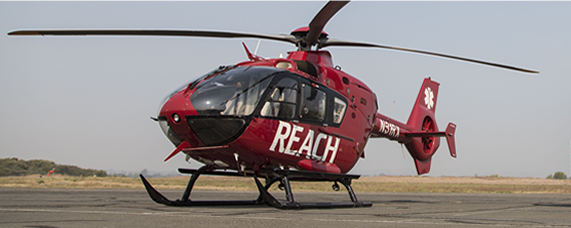Widgetized Section
Go to Admin » Appearance » Widgets » and move Gabfire Widget: Social into that MastheadOverlay zone
Air ambulance services stress role of transport during COVID-19 crisis

Air ambulance services are playing a critical role in far-flung rural areas of Colorado during the ongoing COVID-19 pandemic, but operators are increasingly concerned about their own viability due to surprise insurance denials that sometimes result from emergency air transports.
“With confirmed cases of COVID-19 across Colorado, rural communities are being impacted by this virus daily,” said Jason Jenkins, South Region director for Global Medical Response. “With higher levels of elderly and people with disabilities, as well as other health risks, rural communities are at risk. Their access to air ambulance services is more important than ever.”
Global Medical Response (GMR) is the largest medical transport company in the world with 4.9 million patient transports in 2019 using 306 helicopters, 106 fixed-wing aircraft and 7,000 ground transport vehicles. The air ambulance industry does about 300,000 transports per year.
“GMR takes a compassionate approach to working with patients when their insurance provider refuses to pay the full cost of their transport,” Jenkins said. “We even have a team of experienced patient advocates that works with patients to help resolve claims with insurance companies.”
The practice of “balance billing,” or sending a patient a sometimes overwhelming bill for the balance of an air transport the insurance company won’t cover – often citing out-of-network denials – happens in about 3% of the 300,000 air transports per year. But the impacts can be devastating, air transport officials say.
“Insurance companies know that GMR is required by law to send the patient a bill for the balance of what the insurance company denies paying, typically claiming that providers are out of network,” Jenkins said. “The only way for GMR to substantially increase the percentage of patients who are in-network is to reach agreements with insurance providers.”
GMR says its air transports are ordered by medical professionals and emergency responders and are not frivolous or over-used, especially in rural areas with limited emergency medical department and intensive care units (ICU’s).
The decreasing number of hospitals in rural areas of the country have an average of five ICU beds per facility, making air transport to a major metro area an increasingly important service. And with COVID-19, patients in mountain areas often have to be treated at lower elevations in Denver or Grand Junction.
Via a spokeswoman last fall, Vail Health President and CEO Will Cook stressed the importance of air transport.
“Vail Health does not own any of the multiple air ambulance providers that use our helipad,” Cook said. “However, we feel this service is important to providing life-saving access to health care facilities for patients as every second counts in emergency situations.”
Jenkins said GMR is eyeing several iterations of legislation that might impact the industry, with different bills and legislative approaches being considered by a variety of committees.
“The most favorable language that ensures the air ambulance industry can continue providing lifesaving medical support to more Coloradans, especially in rural parts of the state, would be the proposed language from the Senate Commerce Committee,” Jenkins said.
“However, Congress has undoubtedly been focusing its time these past several weeks on addressing stimulus relief due to the COVID-19 pandemic, which should be the top priority for our country,” he added.
Annalyse Keller, a spokeswoman for Colorado Sen. Cory Gardner, said late last year that the senator is aware of the importance of air transport and was working to “lower health care costs, improve access and expand coverage for Coloradans across all four corners of the state.”


